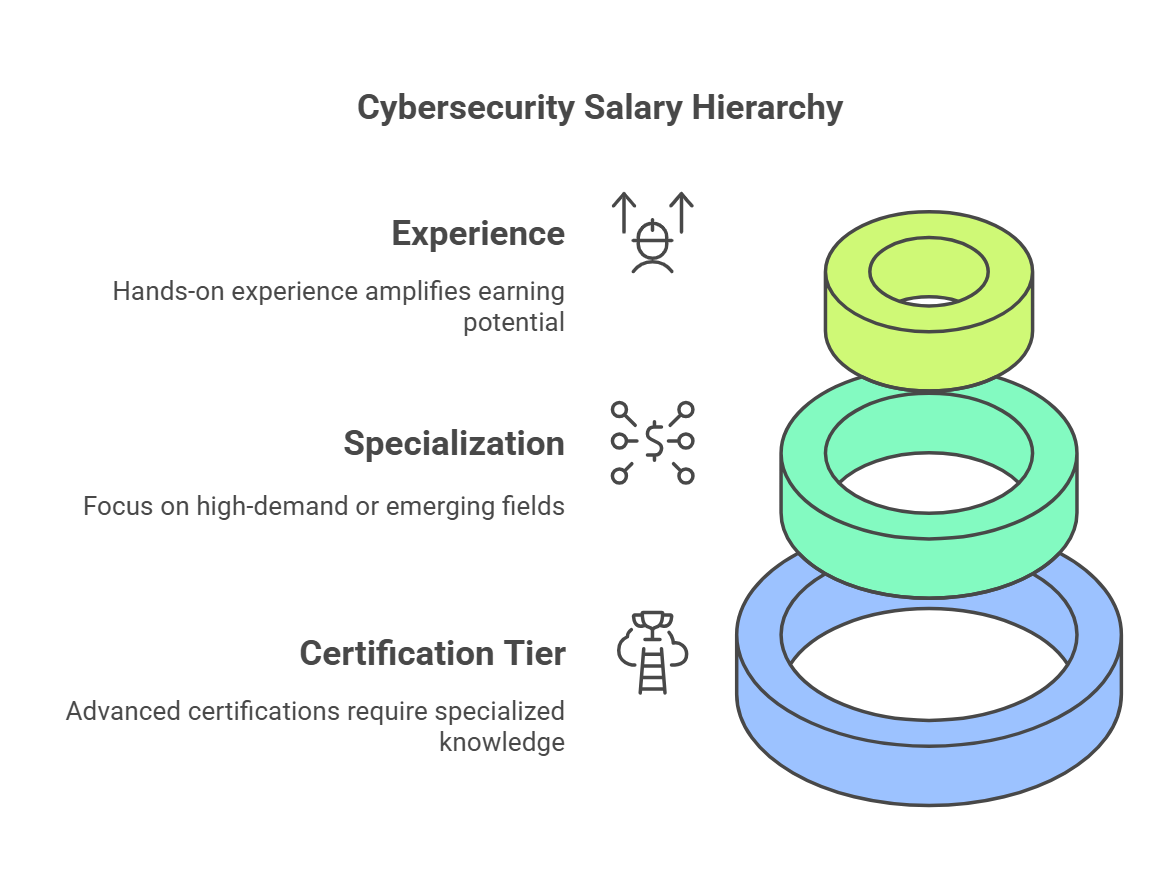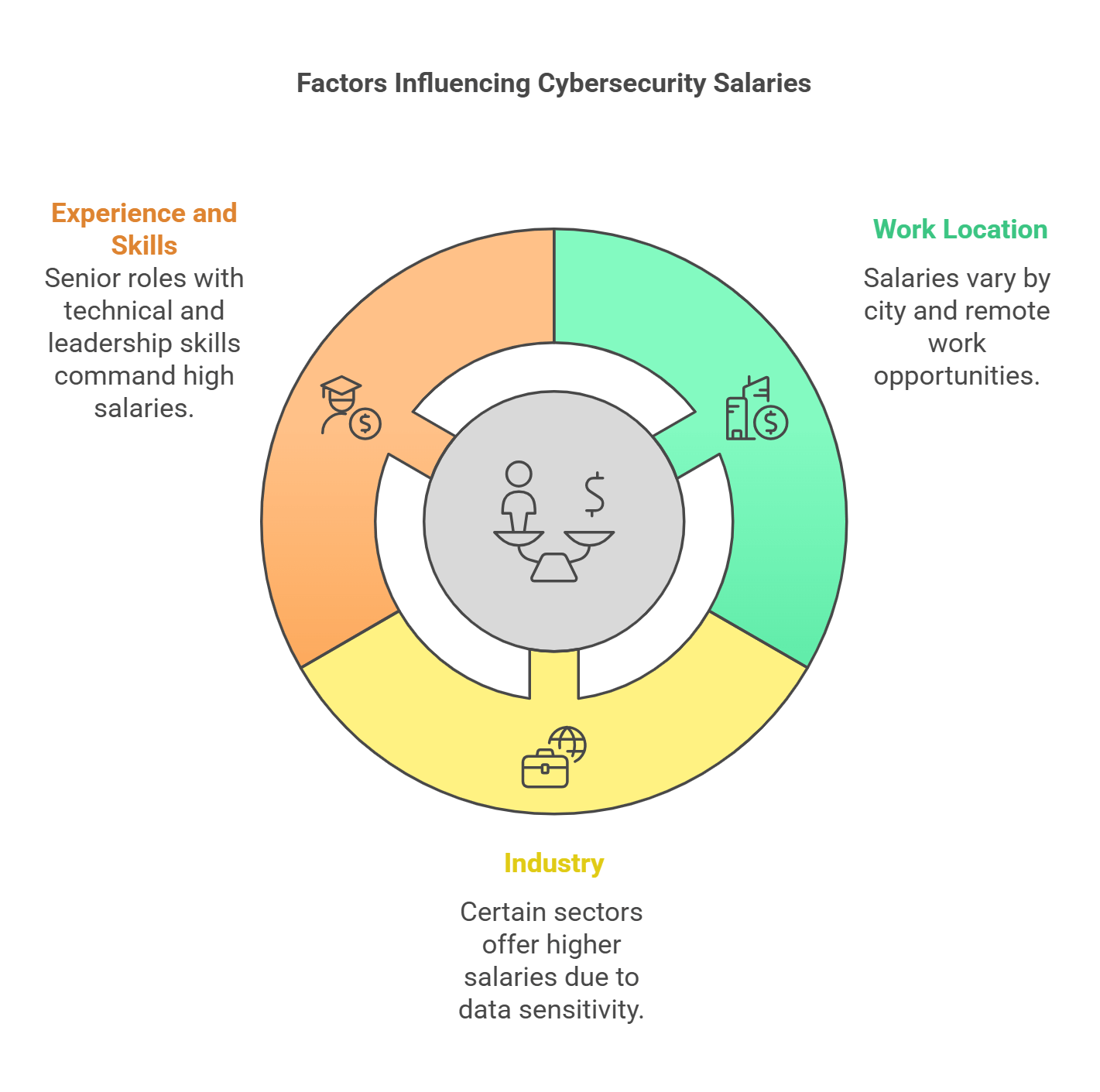Table of Contents
- Why Do Cybersecurity Certifications Impact Salary?
- 1. Certification Tier
- 2. Specialization
- 3. Experience
- The Impact of Certifications on Cybersecurity Salaries
- The Role of ACSMI in Maximizing Your Cybersecurity Certification Salary
- Factors That Determine Cybersecurity Salaries
- How to Maximize Your Cybersecurity Certification Salary
- Cybersecurity Certification Salary at Different Career Stages
- Final Thoughts
- FAQs on Cybersecurity Certification Salary
Cybersecurity is one of the most in-demand professions globally. With cyber threats becoming more sophisticated and businesses increasingly dependent on digital infrastructures, companies are willing to pay top dollar for qualified cybersecurity professionals. Cybersecurity Certification Without Experience is a powerful tool to position yourself for high-paying roles, whether you’re just starting or looking to specialize. This guide will explore how certifications impact your salary, the earning potential of different roles, and how platforms like ACSMI Certification can boost your credentials and earning potential.
Why Do Cybersecurity Certifications Impact Salary?
Cybersecurity certifications serve as formal proof of your expertise, building trust with employers and helping you stand out in the competitive job market. Several factors influence how cybersecurity certifications affect your salary potential:

1. Certification Tier
Advanced certifications naturally command higher salaries because they require more specialized knowledge and practical experience. For instance, a CISSP or CISM certification, which focuses on leadership and strategic risk management, tends to open doors to higher-paying, senior roles compared to entry-level certifications. These advanced certifications require a deep understanding of complex cybersecurity principles and are usually pursued after years of experience, making them highly valued in the market.
2. Specialization
Certifications that focus on high-demand or emerging fields like cloud security, ethical hacking, or digital forensics can significantly increase your earning potential. Specializations are often linked to roles that require specific expertise, such as Cloud Security Architect or Penetration Tester. Employers pay a premium for professionals who can handle niche cybersecurity needs that are critical to protecting their systems from advanced threats.
3. Experience
While certifications provide the foundational knowledge required for various roles, experience amplifies your earning potential. Experienced professionals with a combination of technical expertise and leadership skills, such as a CISO, can expect to command six-figure salaries or higher. Employers value candidates who not only hold certifications but also demonstrate hands-on experience in real-world cybersecurity challenges, making it an essential factor for higher pay.
The Impact of Certifications on Cybersecurity Salaries
As you progress in your cybersecurity career and gain certifications, your earning potential improves. Below is a breakdown of the average salaries for various roles based on certification levels:
Beginner Certifications (Entry-Level Roles)
-
CompTIA Security+
-
Average Salary: $65,000 – $85,000/year
-
Roles Include: Cybersecurity Analyst, IT Support Specialist
-
-
ACSMI Certification
-
ACSMI’s beginner modules focus on areas like incident response, basic threat detection, and network defense. These foundational skills are essential for entry-level roles in cybersecurity.
-
Benefits:
-
These certifications provide a solid grounding in cybersecurity basics, allowing professionals to quickly transition into roles that serve as stepping stones to higher-paying positions. The foundational knowledge equips candidates with the necessary tools to address common cybersecurity challenges effectively.
Intermediate Certifications (Mid-Level Roles)
-
Certified Ethical Hacker (CEH)
-
Average Salary: $85,000 – $115,000/year
-
Role: Penetration Tester, Security Consultant
-
-
Certified Information Systems Security Professional (CISSP)
-
Average Salary: $120,000 – $140,000/year
-
Role: Security Analyst, Risk Manager
-
-
ACSMI Intermediate Modules
-
These modules focus on penetration testing, ethical hacking, and data recovery, helping professionals specialize in these high-demand fields.
-
Benefits:
-
These certifications prepare you for more technical, specialized roles and offer a higher salary range due to the deeper knowledge required. With these credentials, you’ll have the expertise needed to tackle more complex cybersecurity challenges and manage systems that demand more advanced protection.
Advanced Certifications (Senior & Leadership Roles)
-
Certified Information Security Manager (CISM)
-
Average Salary: $140,000 – $160,000/year
-
Roles Include: Information Security Manager, Chief Information Security Officer (CISO)
-
-
Certified Cloud Security Professional (CCSP)
-
Average Salary: $150,000+
-
Role: Cloud Security Architect
-
-
ACSMI Advanced Modules
-
These advanced modules cover governance, risk management, cryptography, and other leadership-focused areas that are essential for senior roles in cybersecurity.
-
Benefits:
-
Advanced certifications are designed for senior professionals looking to take leadership roles within organizations. They prepare candidates for high-level decision-making, overseeing entire cybersecurity strategies, and ensuring the security of enterprise-level systems. These roles come with substantial responsibilities and the corresponding high salary potential.
The Role of ACSMI in Maximizing Your Cybersecurity Certification Salary
ACSMI offers a unique advantage by providing more than just theoretical knowledge. It bridges the gap between academic learning and real-world application, helping you develop skills that are directly applicable to current cybersecurity job requirements. With over 400 specialized learning modules, ACSMI prepares you for various stages in your cybersecurity career, enhancing your earning potential.
ACSMI Certification Pathway
-
Beginner Modules: Focus on foundational skills such as network defense and basic threat detection, preparing you for entry-level positions.
-
Intermediate Modules: Dive deeper into penetration testing, ethical hacking, and threat simulation, helping you specialize in high-demand fields.
-
Advanced Modules: Specialize in governance, risk analysis, and cryptography, equipping you for leadership roles in cybersecurity.
By completing ACSMI certification, you are gaining hands-on experience with interactive labs and case studies, which make you more competitive and ready for high-paying roles.
Factors That Determine Cybersecurity Salaries
Cybersecurity salaries are influenced by several key factors beyond just certifications:

1. Work Location
The location of your job significantly impacts your salary. Cities like San Francisco, New York, and Washington, D.C., are known for offering higher salaries due to the demand for cybersecurity professionals and the high cost of living in these areas. Moreover, with the rise of remote work, you may also find opportunities for high-paying remote cybersecurity roles.
2. Industry
The industry you work in can also affect your salary. Sectors such as finance, healthcare, and government often offer higher salaries because of the sensitive nature of the data they handle. Cybersecurity professionals in these industries are responsible for safeguarding highly valuable and confidential information, making them essential to the organization’s success.
3. Experience and Skills
Seasoned professionals who possess a blend of technical expertise and leadership abilities can access the most lucrative roles. Senior positions like CISO, which combine strategic oversight with in-depth technical knowledge, come with the highest salaries in the cybersecurity field.
How to Maximize Your Cybersecurity Certification Salary
To maximize your earning potential, here are some steps you can take:
1. Select Career-Aligned Certifications
Choosing certifications that align with the most in-demand skill sets in your desired role can significantly increase your salary. For example, those specializing in cloud security should pursue certifications like CCSP or ACSMI’s Cloud Security modules, as they align directly with industry demand.
2. Pursue Continuous Learning
The cybersecurity field is constantly evolving. Pursuing continuous learning through advanced certifications, staying updated with the latest trends, and participating in practice labs will ensure that you remain competitive and can command higher salaries.
3. Gain Practical Experience
Hands-on experience is invaluable in the cybersecurity field. Platforms like ACSMI allow you to practice real-world cybersecurity challenges through interactive labs, providing you with the expertise needed to tackle complex issues in high-paying roles.
4. Network
Networking with professionals in the cybersecurity industry, attending conferences, and joining industry-specific groups can expand your career opportunities. Networking opens doors to high-paying roles and connects you with potential employers looking for your skillset.
Cybersecurity Certification Salary at Different Career Stages
As your career progresses, so does your earning potential. Certifications from ACSMI ensure that professionals are well-equipped for each stage of their career, from entry-level roles to senior leadership positions.
Final Thoughts
Cybersecurity certifications play a crucial role in determining your salary. Whether you’re just starting in the field or looking to advance to leadership roles, certifications equip you with the skills necessary for high-paying positions. Platforms like ACSMI offer a comprehensive learning pathway that ensures you are well-prepared for today’s cybersecurity challenges. By selecting career-aligned certifications, gaining practical experience, and networking with industry professionals, you can unlock your full earning potential and enjoy a rewarding career in cybersecurity.
FAQs on Cybersecurity Certification Salary
What is the highest paying certification in cybersecurity?
Certifications like CISM, CCSP, and ACSMI’s advanced modules often lead to six-figure salaries or higher due to their specialized focus on leadership and high-demand areas.
Does having multiple certifications impact salary?
Yes, professionals with multiple certifications demonstrate expertise in a variety of areas, which often correlates with higher salaries and broader career opportunities.
How does ACSMI contribute to salary growth?
ACSMI’s practical-driven modules help professionals excel in real-world applications, a key differentiator when negotiating salaries, making them more competitive candidates for high-paying roles.
What industries pay the most for cybersecurity professionals?
Finance, government, and healthcare are among the highest-paying industries for cybersecurity professionals due to the sensitive data they manage.
How quickly can I start earning after certification?
Entry-level certifications like CompTIA Security+ can yield results in as little as six months, while ACSMI’s modules give immediate access to skills that employers highly value.

Leave a Reply